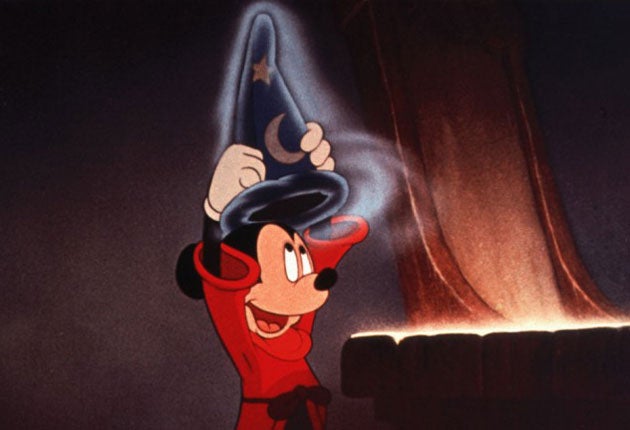Mickey Mouse to get a makeover

Your support helps us to tell the story
From reproductive rights to climate change to Big Tech, The Independent is on the ground when the story is developing. Whether it's investigating the financials of Elon Musk's pro-Trump PAC or producing our latest documentary, 'The A Word', which shines a light on the American women fighting for reproductive rights, we know how important it is to parse out the facts from the messaging.
At such a critical moment in US history, we need reporters on the ground. Your donation allows us to keep sending journalists to speak to both sides of the story.
The Independent is trusted by Americans across the entire political spectrum. And unlike many other quality news outlets, we choose not to lock Americans out of our reporting and analysis with paywalls. We believe quality journalism should be available to everyone, paid for by those who can afford it.
Your support makes all the difference.Long before Pixar, before Tom and Jerry, Bugs Bunny, Popeye, Spider-Man, Superman, The Beano or The Dandy, there was a mouse called Mickey. He is possibly the best-known character ever to have come out of Hollywood. There is hardly a child or an adult in the developed who would not recognise Mickey Mouse from just a silhouette of two round ears protruding from the top of a round, hairless head.
He has been preserved, unchanged for decades, as the ultimate American symbol of wholesome children’s entertainment, rated by Forbes as the world’s most valuable character, generating £3bn a year in merchandise sales, a formula the Disney Corporation has not dared to tamper with.
That is about to change. Mickey is to move with the times, with the arrival next year of a video game, Epic Mickey. And, according to The New York Times, Disney is worried that, although most children know who Mickey Mouse is, they do not identify with his adventures as they do with more contemporary animated heroes such as Russell, from the latest Pixar film Up, or Nemo the fatherless fish, or even Bart Simpson – all children in need of adult supervision, whereas sensible Mickey, who is more miniature adult than child.
Mickey was a bit of a wild child himself when he first appeared, in 1928, in the changeover period when silent movies were being superseded by the “talkies”. He played practical jokes, he pursued his girlfriend Minnie aggressively, and in Steamboat Willie, he vented his anger on an undeserving parrot.
Steamboat Willie was actually not the first Mickey Mouse cartoon, but it was the first with synchronised sound, and its success made Walt Disney the most famous animator in cinema history, and led to countless more short cartoons, Mickey Mouse comics, spin-offs of every description, including cuddly toys and T-shirts, and hundreds of Mickey Mouse clubs across America.
But in the 1930s, when America was threatened by recession and political radicalism, the conservative, communist-hating Walt Disney toned down Mickey’s behaviour and created the bland, all-American mouse kid that he has been ever since.
Animators once made a cartoon for a private viewing to amuse their boss, in which Mickey went all the way with Minnie. Disney congratulated them on the craftsmanship, asked for the names of all those involved and then sacked them. No one could tamper with Mickey’s family-friendly image, even as a private joke.
His name also went into the language, “Mickey Mouse” being used, or misused, as an adjective, to mean ridiculous or insignificant. It caused a ghastly misunderstanding in a British court in 1990, when a judge named Michael Davies, who was angry about a run of absurdly large libel awards, admonished a jury in a case involving the distribution of a few libellous pamphlets not to make a “Mickey Mouse” award. By “Mickey Mouse”, he meant “ridiculously large”, but the jury thought he meant “ridiculously small” and awarded the plaintiff £1.5m, the highest ever in British legal history.
In his new video game incarnation, Mickey will go back to being the mischief-maker that he was before the Wall Street crash. Epic Mickey, designed for Nintendo’s Wii console, is set in a “cartoon wasteland”, where forgotten and retired Disney characters live, including Oswald the Lucky Rabbit, who last appeared in a cartoon in 1951. He is not so lucky in the video game. Indeed, he reappears as an embittered character, envious of Mickey’s fame. “What we are trying to do is make Mickey more youthful, more funny and more mischievous,” a spokeswoman said. “He has been completely successful in other areas of our business, and it’s only in the video game that we changing him.”
But Disney has before its eyes the cautionary tale of “New Coke” – Coca Cola’s attempt to update a cultural icon by altering the formula and advertising the “new taste” of what they officially called Coca Cola II. It was a failure, and after a few years, they were back marketing “Classic Coca Cola”. Perhaps, after a few years of the new Mickey, the Disney Corporation may suddenly have to go back to Classic Mickey, the bland and family-friendly mouse.
Join our commenting forum
Join thought-provoking conversations, follow other Independent readers and see their replies
Comments